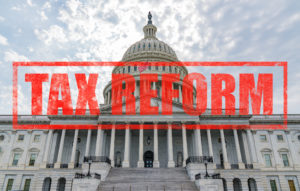Will homeowners of the future lose the American Dream due to the new laws of the Tax Cuts and Jobs Act? Homeowners and potential homeowners, take heart. There’s still plenty of luster on that American dream. Here at Principal Law, we opened the topic of the effects of the new Tax Cuts and Jobs Act on home ownership in our previous blog. If you’re house hunting, or a homeowner, you will want to read this blog.
Although it has its own title, this article is actually Part 2 of our last blog, Tax Laws, New Rules and a Valentine to Homeownership. Thus we suggest you read or review that article to get the backstory for this one, although we do include some review.
Although Valentine’s Day has passed, we still express our love for the goal of home ownership.
It’s a dream that is alive and well. And this dream will continue in 2018, although the housing market might slow down. You see, at Principal Law, we do not believe people buy homes just to save on their taxes.
Homeowners: Fear Not The New Laws

Dream to Own Your Own Home Is Safe….
Tax Reform May Help Some!
Keep in mind that the new laws represent “the most significant overhaul of the tax code since 1986.” Homeowners might have a lot to learn about tax laws, but Principal Law is here for you with expertise in real estate law.
Shaina Mishkin reporting for “Money” online, stated, “The new law, signed in December by President Trump, should deliver most Americans — and perhaps even most homeowners — an overall tax cut. But that’s largely because of provisions that benefit taxpayers across the board, like an increased standard deduction and lower marginal tax rates.”
She went on to explain why homeowners have been discouraged with the new laws. “Meanwhile Congress — partly to offset the cost of these broad cuts — also curtailed some provisions that specifically benefit homeowners, like deductions for mortgage interest and state and local taxes.”
Homeowner’s Love Story Number One: Luke and Anna and their Moderately Priced Home
Also in our previous blog, we promised you some homeowners’ stories and examples to bring the new tax laws to life. So we begin with a couple who own a nice, cozy ranch-style two bedroom, two bathroom home and a $200,000 mortgage.
The husband, Luke is hoping they will save some money from their tax refund, but Anna would just like to avoid the hassles of itemizing.
Keep in mind the couple will have a standard deduction of $24,000 when they file their joint return. Anna figures their deductible housing cost. This includes home interest, taxes, and other allowable deductions. Her calculations show their total deductible housing cost will come to $14,325 for the year.
She starts to smile as she reflects on the previous year.
Homeowners Compare Previous Years Law to 2018
She had itemized the previous year. The previous years housing cost very closely matched this year’s cost of $ 14,325. But, last year, only $12,700 standard deduction was allowed for the couple. As their itemized cost was $1625 more, Anna decided to itemize. At great cost of her time and tons of paperwork, she itemized. And she saved the family a few hundred dollars.
But now, as she looks at her calculation, Anna’s slight smile becomes a full-blown grin. $14,325 is well under the new threshold of the $24,000 standard deduction. These homeowners have no other big deductions. This means they will not have to itemize and they will still save a little money.

I Love Doubling The Standard Deduction
The Homeowners Tax Take-Away: Anna and Luke provide us with an example of the power of the new Standard Tax Deduction.
In the words of the Washington Post, “For many homeowners, it no longer makes sense to itemize deductions.” So, let’s see some more statistics on this claim:
Zillow reports, that to “98 percent of the homes in the District, it made sense to itemize under the old law.” They added, “Now, for only 64 percent of D.C. homes does it make sense to itemize (by taking the mortgage interest deduction and property tax deduction) rather than take the standard deduction.”
Let’s summarize, “Standard deduction eliminates the need to itemize for homeowners with mortgage interest and property tax bills that fall below the thresholds.” This statement assumes there are no other major deductions.
Luke and Anna feel like they are homeowners who have it all: A great little house…A simple tax filing…Some tax savings. We leave Anna and Luke doing an impromptu happy dance.
And now, we move on to the story of Bob and Dorothy.
Homeowners’ Love Story Number 1: Bob and Dorothy and the Dream House
Bob and Dorothy of Los Angeles bought their dream house for $890,000.
In case you did not know, homeowners could previously deduct interest on mortgage payments up to a million dollars. However, those days are gone and the tax law has proclaimed the new cap is $750,000.
Therefore, Bob and Dorothy will itemize their deduction. With the individual deductions they can take, they are confident they can make up the difference. They will itemize.
Keep in mind that although the individual deductions they can take are not worth as much as they were in previous years, many of them still exist. Also keep in mind that Bob and Dorothy, both executives at software companies, make quite a bit more money than Anna and Luke. They are much more likely to benefit from lower marginal rates on income.
The Big SALT Difference in Tax: Where You Live in the US

S.A.L.T. Living In Small Town, USA Can Save Tax Dollars.
New York City: Now let’s pretend that they live in New York City and earn $155,300 per year. The median value of their home is $790,100 and they pay $11,452 in annual property taxes. All told, they will pay approximately $23,399 per year in combined income and property taxes.
Raleigh, North Carolina: Let’s pretend they live in Raleigh. If the couple lived in Raleigh, they might make a little less money. They might bring home about $132,400.
Their comparably built home would be valued at $405,600. However, they pay about $6,751 in state income tax and $3,491 in annual property taxes, on average, for a combined total of $10,242. They can use that $10,000 standard deduction and pay tax on a mere 242.00 of it. Remember the 10,000 (SALT) standard deduction includes state local and property taxes
Homeowner’s Love Story Number 2: George and Angelina and the Romantic Rent House
George and Angelina worked hard for almost two years to wipe out their credit card debt and save a down payment. They were hoping to buy a house in the near future. Since they make $75,000 per year, they belong to a group called the “breakeven” group. Break-even rents are “the monthly amount above which renters are better off becoming homeowners.”
That amount went up among upper-middle class and wealthy taxpayers. “For instance, under the old rule, for a typical three-person family earning $75,000, owning became more advantageous once the family’s monthly rent exceeded $893. Under the new law, that number climbs 14% to $1,017.”
Thus, since the advent of the new tax laws, George and Angelina and their 3-year-old daughter are not so sure they want to be homeowners yet. They might reconsider remaining in their cramped rent house at $1100 per month for a little while longer. However, they long for the freedom and space of a house so they can have another child. They are sitting almost directly on the break-even point, but they are highly motivated.
So here at Principal Law, we expect them to be homeowners by the end of the year in spite of the new tax laws or the housing market. With them, it will be a matter of the heart.
Homeowner’s Love Story Number 3: Zack and Lisa in their Empty Nest
Zack and Lisa are an older couple, and they are ready to downsize. Zack’s health is not good. And a nice apartment in an assisted living retirement complex seems more attractive to them. Likewise, they like the security of the nest egg they could get if they sold their home at a good price.
The good news for them is termed capital gains exclusion. Capital gains exclusion means that they, as home sellers, can exclude up to $500,000 for selling their primary home and joint filing. They have lived in the home 11 years, which is

Some Millennials Simply Adore their Dog, part of the motivation for buying a house.
more than enough to qualify. The
qualification requires only 2 of the last five 5 years residency in the home.
You’ll note that we have named the four stories above, “love stories.” The romance between home ownership and America has endured for centuries. The new tax laws might slow it down. But, it won’t stop it. People love to feel free in their own space.
Even millennials are catching the fever, and for them, it isn’t always about having a marriage or children or security. For some, it boils down to another very American dream. They want to get a dog. “A third of millennial-aged Americans (ages 18 to 36) who purchased their first home (33%) say the desire to have a better space or yard for a dog influenced their decision to purchase their first home.”
Even as we smile, we have to think, unconditional love can make a house your home. That’s worthy of your tax dollars.



